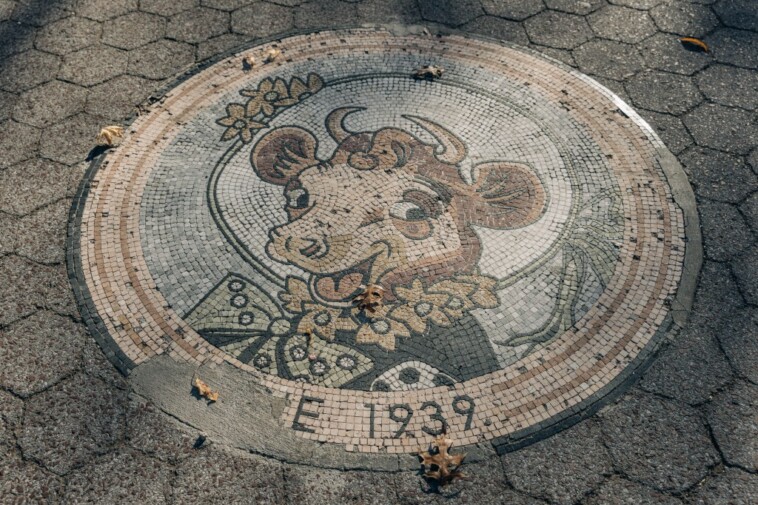They’re trying to pick up the pieces.
Five historical mosaics commemorating Queens’ World Fairs will be demolished in the next few months — despite preservationists’ impassioned pleas to rescue the pieces of New York’s past.
History lovers are outraged that the Parks Department is abandoning hope of restoring the intricate medallions adorning the entrance to Flushing Meadows Corona Park, with officials claiming the severely eroding tiles pose a safety hazard to pedestrians.
“In Europe and the Middle East, mosaics are rediscovered after many, many centuries of abandonment. They are uncovered and they exist. Archeologists and government officials go to great lengths to preserve those — why should Queens, AKA the World’s Borough, be treated any differently?” fumed Michael Perlman, founder of the Rego-Forest Preservation Council.
Perlman says preservationists have been banging the drum for 15 years to rescue the deteriorating Passerelle Plaza Mosaics, but their pleas have fallen on deaf ears.
The parks department may have even contributed to the accelerated decay, Perlman alleged, by “obnoxiously” tossing on the artwork to melt snow and by driving heavy vehicles over the installations.
“Nobody’s been taking care of them. I’ve been photographing them for over one and a half years and they continuously get worse and worse,” said Gloria Nash, 70, whose upcoming book “Looking Back at the Future” chronicles the living relics of the ’39 and ’64 World’s Fairs in Queens and across the globe.
As many as ten medallions have already been lost to history since they were laid in 1997 at the base of David Dinkins Circle, adjacent to the Billie Jean King Tennis Center, as a tribute to the ’39-40 and ’64-65 Fairs.
Each mosaic honored a different scene from the historical fairs, including the synchronized swimming show dubbed the “Aquacade” and the still-standing New York State Pavilion, which once invited parkgoers to climb its observation deck and watch the Fairs from above. Most have either been paved over with concrete or were completely demolished.
Only five remain today: an imitation of Salvador Dali’s “Venus,” the World’s Fair Fountain, the Hall of Science and Elsie the Cow, the real-life mascot for Borden Daily who visited the ’39 World’s Fair.
The largest remaining mosaic is an homage to Andy Warhol’s portrait of Robert Moses, the then-Parks Department commissioner who masterminded the ’64 World’s Fair as an opportunity to transform the Queens park.
Each of the remaining mosaics has been seriously eroded, and chunks of missing tile have been replaced with pours of concrete.
Perlman, Nash and other members of the Rego-Forest Preservation Council ignited a renewed campaign two years ago imploring the Parks Department to make plans to rescue the remaining decaying mosaics, but their pleas went unanswered until October when the agency revealed it was going to scrape the art installation entirely.
Administrators penned a letter to the preservation group blaming the deterioration on the “natural elements” — and claiming an expert condemned the installation back in 2009 as a tripping hazard and “not salvageable.”
“After much deliberation, and continued deterioration of the mosaics, NYC Parks has determined the best course of action will be to remove the mosaics and replace them with pavers similar to the surrounding plaza, making the grade even and thereby addressing the tripping hazards currently created by the pieces,” the letter, viewed by The Post, stated.
A representative from the Parks Department confirmed it has plans to tear out the medallions sometime within the next calendar year. They declined to say if they would consider the requests to save the artwork.
The colorful mosaics will be replaced with the drab, gray pavers similar to the surrounding plaza — and there is no hope of preserving the decades-old tribute to Queens history.
Instead, the Parks Department will funnel up to $20,000 in grant money per year to display temporary art installations.
“It’s really a shame,” said Perlman, who recently rediscovered a long-lost World’s Fair-era mural in a Massachusetts basement.
“These mosaics were put here as a tribute decades after the World’s Fairs. It’s marvelous how the Parks Department cared back … They’re destroying something symbolic.”
For Nash, who was lucky enough to visit the ’64 World’s Fairs as a child, the loss of the mosaics would be nothing short of heartbreaking.
“There are other people that feel the same. These Fairs are very, very special to too many people, not just older people, but younger people. I know so many younger people interested in the Fair, even though they never went and I find that amazing,” said Nash.
The pair, along with other preservationists, are hoping the Parks Department will reverse its decision and make efforts to properly preserve the five remaining mosaics, whether that be in their original David Dinkins Circle resting place or relocated to the nearby Queens Museum.
“Art is a gift for the masses,” said Perlman.
“Flushing Meadows Corona Park is a public park and I’m hoping they restore the ‘public’ in this public park.”










